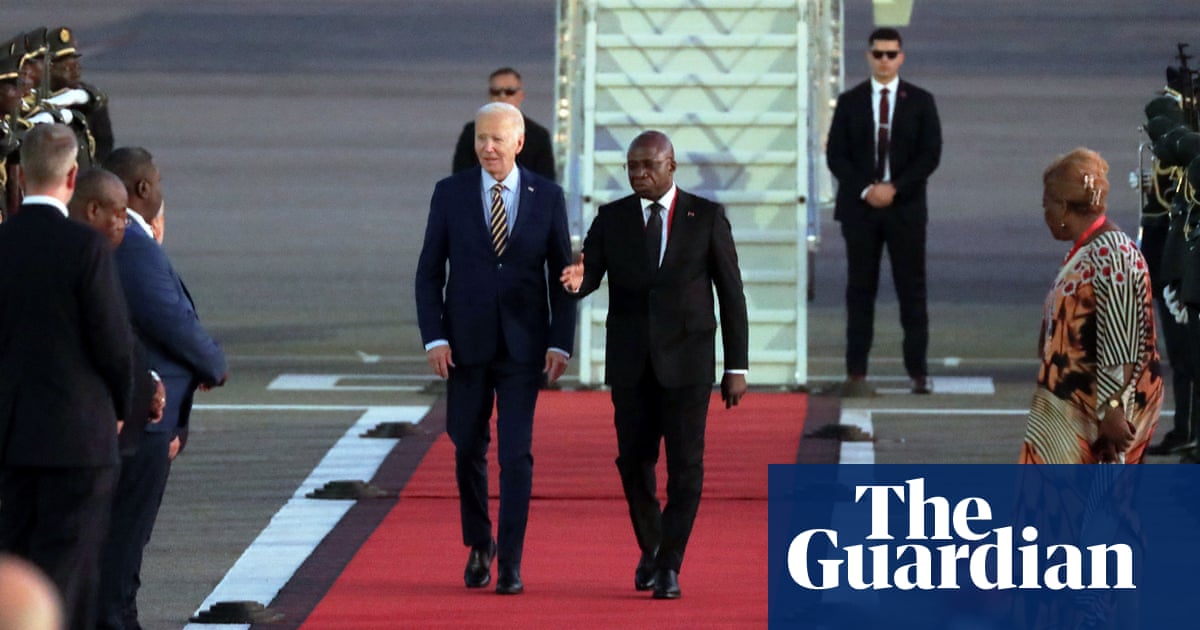
Joe Biden will address America’s history of enslavement in a speech on Tuesday at Angola’s National Museum of Slavery, during a trip in which he is also expected to laud recent US investment in the region.
Biden’s visit to the museum will take in the 17th-century Capela da Casa Grande, where enslaved people were forcibly baptised before being trafficked across the Atlantic. About 4 million Angolans were enslaved in the Americas from the 16th to the 19th century, most in Brazil.
The first African slaves in the US were shipped to Hampton, in the then British colony of Virginia, from Angola in 1619. Almost a quarter of the 472,000 people forced into slavery in the US came from the west and central region of Africa that includes Angola, according to the Slave Voyages database.
Angola’s National Museum of Slavery was founded in 1977 on the former estate of Álvaro de Carvalho Matoso, one of the biggest traders of enslaved people from Africa in the 18th century.
The US announced a grant of $229,000 to support the museum’s restoration and conservation on Monday, the day Biden landed in Angola. It also said it supported Angola’s bid to have the Kwanza corridor, a route of more than 100 miles that captured slaves were marched along from the interior to the coast, declared a Unesco world heritage site.
A White House statement said: “We share a commitment to reckon with the horrific history of the transatlantic trade of enslaved people by striving to reconnect cultures and celebrating collaboration between our nations … Today, there are nearly 12 million Americans of Angolan descent.”
Portugal’s history of enslaving Africans has also come under more scrutiny in recent years. Portugal started to colonise Angola in 1575, when Paulo Dias de Novais established the fortified settlement of Luanda south of the Kwanza River with 100 families and 400 soldiers. Luanda is now Angola’s capital city.
Portugal enslaved almost 6 million Africans, almost half of all the people trafficked to the Americas and more than any other European nation. In April, Portugal’s president, Marcelo Rebelo de Sousa, said the country was responsible for crimes committed during its colonial rule including slavery. He suggested reparations were needed, prompting a backlash from Portugal’s rightwing parties.
Angola’s president, João Lourenço, has said the oil-rich country will not ask Portugal for reparations, saying it is “impossible” to make up for the past.
On Wednesday, Biden is scheduled to visit the port of Lobito, where he is expected to tout $4bn of investment pledges by western governments and companies in upgraded and new rail and port infrastructure. The so-called Lobito corridor is intended to transport minerals needed for batteries and electric cars from the Democratic Republic of the Congo and Zambia to the world via Angola.
Many analysts have viewed it as a belated play by the US and its allies to start catching up with Chinese investment on the continent. However, the US and Angola have resisted framing it in such terms. Lourenço, who declared national holidays on 3 and 4 December for Biden’s visit, has said his country will not ally with one of the US or China.
after newsletter promotion
John Kirby, the White House national security communications adviser, said on Monday: “We’re not asking countries to choose between US and Russia and China. We’re simply looking for reliable, sustainable, verifiable investment opportunities that the people of Angola and the people of the continent can rely on.”
He said Biden’s team hoped that Donald Trump would also see the Lobito corridor’s value.
Reuters and Associated France-Presse contributed to this report
Source: theguardian.com

















